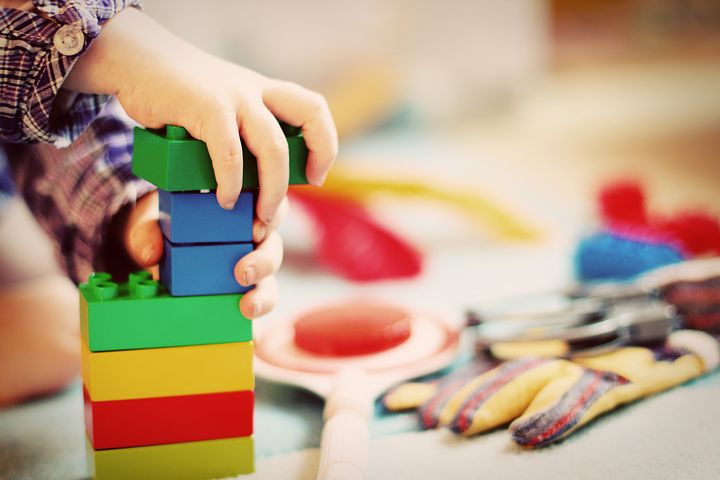You’re driving your child to the beach, shopping, an activity, or to run an errand. It suddenly hits you – you have a fully-fledged school-aged child who’s needs are now very different to that of a newborn, which feels like it was only a short while ago.
No matter what age your child may be, the question always seems to hang around – I am doing enough for him / her? Is my child developing as expected for their age? These are questions that can cause some anxiety and worry for parents and while I can’t help in all areas of development, I can definitely give you some ideas for language and literacy development. I also think I can safely say that you are probably doing more than can ever be asked of you (which is probably why you’ve taken the time to read this post!).
If you find your child is not hitting many of the three-year old milestones, you may want to visit our previous post that discusses how to help a four year old.

Exploring provides so many language and learning opportunities.
Please remember all children develop at their own pace. This post is designed to help your child, if you do have any concerns. It may also be helpful for parents who are out of ideas on how to continue to help develop language skills.
Here are some of the key skills that we look for in children by the time they turn five:
Receptive Language
Receptive language is the ability to understand words and language. It involves understanding words, sentences and meaning of what is said or read. Receptive language is a key foundation skill of overall language development. Children with receptive language delay can have difficulties at home, school and at work.
Target |
How you can help your child |
|---|---|
|
Follow 3 step instructions (e.g. get the ball, |
Give your child opportunities to follow 3-step instructions. Ask your child to help set the dinner table, unload the dishwasher, etc. Provide unusual instructions during these tasks e.g. ‘clap your hands, put a spoon away and then give me a high 5’. Your pre-schooler should be able to follow the complete instruction, in the correct order. You should be able to provide the instruction all at once rather than pausing while each step is completed. |
|
Understand concepts such as opposites (high/low; wet/dry), order |
Talk about words and their opposites e.g. I am short but dad is tall. Compare who is taller and who’s the tallest. Start giving your child instructions that have time / order words e.g. ‘put on your shoes before you get your hat’. Change the word order (before get your hat, put on your shoes). |
|
Can sort objects / pictures into sub-categories |
Group objects into sub-categories e.g. winter / summer clothes, hot / cold foods, sea / land / sky animals, etc. You can use junk mail, toys, real objects or printed pictures. Talk about how items within the categories are same and different. |
|
Respond to higher-level questions that require thinking outside the here-and-now |
Questions such as ‘what would happen if…?’; ‘ how do you think the boy might be feeling?’ should be responded to with a plausible answer. Support your child to answer these kinds of questions by providing possible reponses, discussing why they may / not not be probable answers; and extending the conversation further. Contact me to receive a comprehensive list of question types to ask.
|
Expressive Language
Expressive language refers to the child’s ability to generate language to communicate their needs and wants. It involves the use of gestures, words, sentences and writing to interact with others. Research shows a strong link between receptive and expressive language abilities, and a child’s later development of literacy skills.
Target Skill |
How you can help your child |
|---|---|
|
Use complete sentences with correct grammar including some irregular verbs (drank, fell) & all pronouns (e.g. he, she, him, her, I, you, them) |
Ensure you are always using correct grammar. Don’t make a big deal of any errors – just say the sentence back with the correct grammar. For example: Child: look, I jump |
|
Enjoy telling stories |
The stories should have a central character or event. There should be a sequence of events that relate to the main character or event. Sentences are often linked with ‘and then’ or ‘and’. |
|
Talk about events which are happening, have happened or might happen using adequate detail |
Ensure your child is using specific words rather than ‘that’, ‘there’, ‘this’, etc. If these non-specific words are being used, teach your child the correct vocabulary. |
|
Speak clearly and should be understood by anyone |
Clarity can be impacted by a number of factors including sound errors, a child’s volume being too soft and / or children talking too fast. If volume or speed are issues, encourage your pre-schooler to adjust their rate or volume accordingly. Feel free to contact me for a fun visual sheet that can help children understand these concepts better. |
|
Use a range of sounds in words: p, b, m, t, d h, w, n, y, k, g, ng, f, l, s, z, sh, ch, j, v |
Your pre-schooler should be correctly using most of these sounds in different positions (start, middle, end) within a word. Some errors are considered to be age-appropriate whilst other are not developmental. If unsure, please contact a speech pathologist to get a sense of whether there is a need for concern. Always say words back correctly to your pre- schooler and do not put pressure on him / her to repeat the word/s. |

Never too old for bubbles!
Some more tips for expressive language
Target Skill |
How you can help your child |
|---|---|
|
Be understood by unfamiliar adults 60% of the time |
Clarity can be impacted by a number of factors including sound errors, a child’s volume being too soft and / or children talking too fast. If volume or speed are issues, encourage your pre-schooler to adjust their rate or volume accordingly. Feel free to contact me for a fun visual sheet that can help children understand these concepts better. |
|
Use a range of sounds in words: p, b, m, t, d h, w, n, y, k, g, ng, f |
Your pre-schooler should be correctly using most of these sounds in different positions (start, middle, end) of a word. Some errors are considered to be age-appropriate whilst other are not developmental. If unsure, please contact a speech pathologist to get a sense of whether there is a need for concern. Always say words back correctly to your pre- schooler and do not put pressure on him / her to repeat the word/s. |
|
Play begins to represent less familiar events (e.g. shopping, doctor) |
Ensure your pre-schooler has toys that enable play and language development. Pretend play toys (e.g. tea sets, doctor’s kit, dress-ups, Duplo blocks, etc) are all great ways to expand a toddler’s imagination, while developing their play and language skills. Play with your child and demonstrate how the toys can be used to pretend. |
General Strategies
- Consider a hearing test, especially if your toddler has a history of recurrent ear infections and / or colds.
- Have fun with books by looking at the pictures and making up your own stories. Make your own books by drawing pictures and telling a story. Talk about how the story might end / start differently.
- Ask open-ended questions that will encourage your child to use longer sentences. For example, ‘how can we tell the boy is sad?’ rather than ‘is the boy sad?’.
- Help develop your child’s pre-literacy skills by discussing how words rhyme; breaking words into syllables; and identifying the sound a word begins / ends with.
- Use lots of specific praise when your child makes any attempts. This tells the child that you are listening and exactly what skill you are aiming for and gives them a reason to try again.

Lego provides so many wonderful language opportunities, all while having fun & bonding with your child.
You may want to seek professional input from a speech pathologist if your child:
- Shows little interest in letters, reading and writing
- Is unable to generate rhyming words; finds it difficult to break words into syllables; or has a
- limited ability to identify the sound a word begins with
- Is difficult to understand or makes sound production errors
- Is unable to accurately recount events from the past
How we can help:
If you find these strategies are not helping your child progress, you may want to contact a speech pathologist. At Chatterbox Speech Pathology, based in Stirling, we can provide lots of practical strategies to help support language development. Our assessments provide insightful information about the things your little one is great at and areas that we can support. We make therapy fun for the child and give parents realistic goals to consolidate at home with practical ideas on how to develop the goals. We provide parent coaching to increase your ability to support your child.
If you would like any further information, please feel free to contact Kunali on 0405 176 931 or Email me.
I hope you have found some useful information about getting your three year old talking in no time. In a few weeks, I will commence a series on a range of specific topics. If you have any topics of interest, please feel free to contact me.






